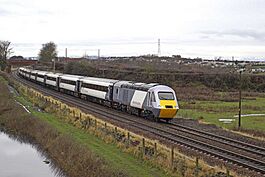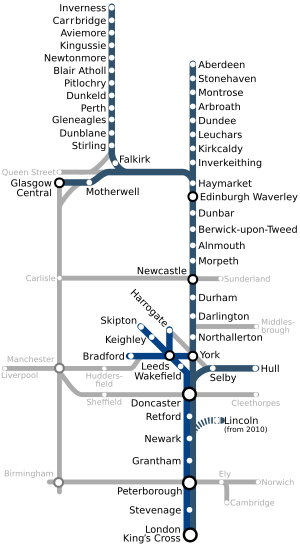National Express East Coast facts for kids
 |
|
| Franchise(s): | InterCity East Coast 9 December 2007 – 13 November 2009 (originally 31 March 2015) |
|---|---|
| Main region(s): | East Midlands, Yorkshire, North East England, Scotland. |
| Other region(s): | London |
| Fleet size: | 31 Class 91 electric locomotives 30 InterCity 225 sets |
| Stations called at: | 53 |
| Stations operated: | 12 |
| National Rail abbreviation: | GR |
| Parent company: | National Express Group |
| Web site: | www.eastcoast.co.uk/ |
National Express East Coast was a company that ran trains in the United Kingdom. It was also known as NXEC Trains Ltd. This company was in charge of the InterCity East Coast rail franchise. A "franchise" means they had a special agreement to operate train services on certain routes. Their trains traveled through parts of England and Scotland along the important East Coast Main Line. NXEC Trains Ltd was part of a bigger company called National Express Group. They took over these train services from another company called the Great North Eastern Railway (GNER).
What Was National Express East Coast?
National Express East Coast was a train operating company. This means they were responsible for running passenger trains. They managed the trains, staff, and services on a specific set of railway lines. Their main route was the East Coast Main Line. This line connects major cities like London, York, Newcastle, and Edinburgh.
The company started running trains on 9 December 2007. They used a mix of different types of trains. These included fast electric trains called Class 91 locomotives and InterCity 225 sets. They also used older, but still fast, diesel trains known as InterCity 125 (HST) sets. National Express East Coast served 53 different train stations. They were directly responsible for 12 of these stations.
Why Did National Express East Coast Stop Running?
In 2009, National Express East Coast faced big financial problems. The company started losing a lot of money. Because of these losses, National Express decided they could no longer run the train services. They chose to end their agreement (the franchise) early.
When National Express East Coast stopped, the government stepped in. The government took over running the trains directly. They created a new brand for these services called East Coast. This was a very unusual situation. It was only the second time in the UK that a private train company had to give up its franchise early. Because of this, the government also ended another train agreement that National Express had. This was for the National Express East Anglia services, which ended three years earlier than planned.
Today, National Express operates far fewer train services than it used to. In 2003, they ran nine different train franchises. Now, they operate only one.
| Preceded by GNER InterCity East Coast franchise |
Operator of InterCity East Coast franchise 2007 - 2009 |
Succeeded by East Coast. |
 | Madam C. J. Walker |
 | Janet Emerson Bashen |
 | Annie Turnbo Malone |
 | Maggie L. Walker |


